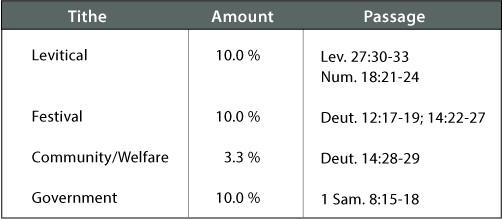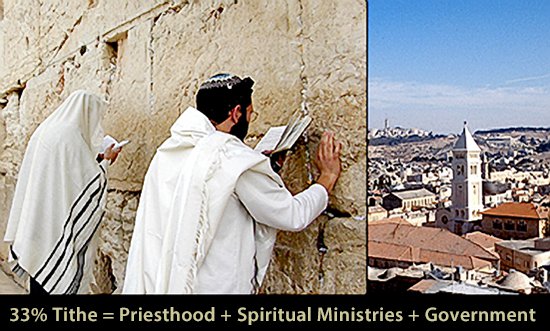One mark of a false teacher is a desire for wealth (2 Peter 2:3) and the opposite is true of God’s spiritual leader. Money is a serious issue for Christians. Our world is preoccupied with it because it is essential for so many things in this life. We are preoccupied with it because we work for it day after day from morning to evening. We are careful about how much we spend so that we do not run out. We use it at a time of crisis and invest it for a future day. Money is not something most of us want to quickly give away to others. It is easy for money to become a god – to want as much as we can get because it means safety and security. Is that why God has asked us to give some of it back to Him? Some churches teach that God wants every Christian to tithe or give Him ten percent. They quote verses in the Old Testament and say that the tithe is a guideline and we should give more. But that is not what the Bible teaches. Tithing is not for the church today. In this study we will see that tithing is not Biblical giving. Yet, God still wants us to give.

The First Tithe
Abraham is the first recorded person in the Bible who gave a tithe. He had just finished rescuing his son-in-law, Lot, from King Chedorlaomer and several other kings who had taken Lot, his family, his wealth, and possessions. After the rescue Abraham returned and a man by the name of Melchizedek came out to meet him.
And Melchizedek king of Salem brought out bread and wine; now he was a priest of God Most High. Genesis 14:18 (NASB)
Melchizedek blessed Abraham and in return Abraham gave this man who was both a priest and king a tithe of the spoils of war (Gen. 14:20). The Hebrew word for tithe means a tenth or ten percent. Abraham gave Melchizedek ten percent. He could have also given more than he did – twenty or thirty percent. Abraham did not need to give him anything. Just choosing to give anything was selfless. He showed his respect and humility to this unusual priest. Giving is the result of a desire to benefit another. It also says something about your heart’s love for money.
Jacob’s Tithe
The next person who tithed in the Old Testament was Jacob, the son of Isaac (the son of Abraham). Jacob had a wonderful dream from God in which God promised to bless him. In response, Jacob decided to give God a tithe of everything God would give him (Genesis 28:20-22).
Then Jacob made a vow, saying, “If God will be with me and will keep me on this journey that I take, and will give me food to eat and garments to wear, and I return to my father’s house in safety, then the LORD will be my God. This stone, which I have set up as a pillar, will be God’s house, and of all that You give me I will surely give a tenth to You.” Genesis 28:20-22 (NASB)
This tithe was Jacob’s choice. It was not required. It was given from a grateful heart. Jacob gave to God and his choice was ten percent. God did not demand any amount. The gift was Jacob’s choice.
Required Tithes
We find tithing again in the Bible when we come to Numbers, Leviticus, and Deuteronomy. It is here that God demands that Israel give Him tithes.
It Is Mine! The first passage is found in Leviticus 27:30.
Thus all the tithe of the land, of the seed of the land or of the fruit of the tree, is the LORD’S; it is holy to the LORD. Leviticus 27:30 (NASB)
God started with a simple statement. All of the tithes belonged to Him. Now there was probably someone who said to himself or herself, “I am giving my money to human priests and I do not trust them.” It is hard to trust church leaders because sometimes they do make bad choices. But God reminded them that He considered the money to be His.
Levitical Tithe. The first tithe or ten percent mentioned in Leviticus is a tithe that belonged to the Levites.
Thus all the tithe of the land, of the seed of the land or of the fruit of the tree, is the LORD’S; it is holy to the LORD. For every tenth part of herd or flock, whatever passes under the rod, the tenth one shall be holy to the LORD. Leviticus 27:30, 32 (NASB)

The same command is repeated in Numbers.
To the sons of Levi, behold, I have given all the tithe in Israel for an inheritance, in return for their service which they perform, the service of the tent of meeting . . . Only the Levites shall perform the service of the tent of meeting, and they shall bear their iniquity; it shall be a perpetual statute throughout your generations, and among the sons of Israel they shall have no inheritance. For the tithe of the sons of Israel, which they offer as an offering to the LORD, I have given to the Levites for an inheritance; therefore I have said concerning them, ‘They shall have no inheritance among the sons of Israel.'” Numbers 18:21-24 (NASB)
God had made it clear. The tithe belonged to the Lord and He had given it to the Levites because of their spiritual ministry. Here is the first example of paying full-time pastors for their ministry. It is biblical to support your pastor.
Later in 2 Chronicles, we find that Israelites understood that the tithe was required.
Also he commanded the people who lived in Jerusalem to give the portion due to the priests and the Levites, that they might devote themselves to the law of the LORD. 2 Chronicles 31:4 (NASB)
The Levites at the time of Moses had responsibility for the ministry in the tabernacle and later for the temple (Exodus 29; Leviticus 8; Numbers 3:5-9; 16:9). The priests had the responsibility for blessing people (Numbers 6:22-26), determining God’s will (Exodus 28:30), and teaching scripture (Jeremiah 2:8; Ezekiel 22:26). This is the responsibility of all pastors (elders) in the church today.
Festival Tithe. When we come to Deuteronomy, we discover there is another tithe or ten percent that was required of the people. It is called the Festival Tithe. This tithe was for food for a festival and it was to be eaten by the community.
You shall surely tithe all the produce from what you sow, which comes out of the field every year. You shall eat in the presence of the LORD your God, at the place where He chooses to establish His name, the tithe of your grain, your new wine, your oil, and the firstborn of your herd and your flock, so that you may learn to fear the LORD your God always. Also you shall not neglect the Levite who is in your town, for he has no portion or inheritance among you. Deuteronomy 14:22-23, 27 (NASB)
According to Jewish tradition, this tithe was called the Second Tithe. The First Tithe is what we have called the Levitical tithe. This means that the Jewish people did not give just ten percent. They gave at least twenty percent of their income to the Lord.
Community/Welfare Tithe. But that is not all. There is still another tithe. It was given every third year.
At the end of every third year you shall bring out all the tithe of your produce in that year, and shall deposit it in your town. The Levite, because he has no portion or inheritance among you, and the alien, the orphan and the widow who are in your town, shall come and eat and be satisfied, in order that the LORD your God may bless you in all the work of your hand which you do. Deuteronomy 14:28-29 (NASB)
This tithe was to be given to the Levites, the strangers, the orphans and the widows. This was a three percent tithe to be spread over three years.
Government Tax. There was another tithe that came later. Today we would think of it as a government tax. The passage we are about to read records the time the Israelites were asking for a king and God warned them what the king would do.
He will take a tenth of your seed and of your vineyards and give to his officers and to his servants. He will also take your male servants and your female servants and your best young men and your donkeys and use them for his work. He will take a tenth of your flocks, and you yourselves will become his servants.” 1 Samuel 8:15-17 (NASB)

This tithe was instituted by the king. God did not command it, but He allowed it.
Do You Believe In Tithing? All these tithes were required of the nation of Israel. That is why God said in Malachi,
Will a man rob God? Yet you are robbing Me! But you say, ‘How have we robbed You?’ In tithes and offerings. You are cursed with a curse, for you are robbing Me, the whole nation of you! Malachi 3:8-9 (NASB)
The tithe was required. God demanded that it be given and the amount each Israelite had to give was thirty-three percent on the average each year. Twenty-three percent of a person’s income was to go to the Lord and ten percent to the government. If you believe in tithing, then you should be offering at least twenty-three percent to the Lord – not ten percent. Ten percent is not biblical.
New Testament Giving
The tithe does not apply to Christians in the New Testament. The tithe was part of the Old Covenant and when the Old Covenant was replaced by the New Covenant, God removed it. It is better to say that God wants us to give. He does not require it. God wants a giving-heart like Abraham’s.
In the New Testament, God has given us some principles for biblical giving. God wants us to give without telling others.
. . . that your giving may be in secret. Then your Father, who sees what is done in secret, will reward you. Matthew 6:4 (NIV)
We are to come prepared to give on Sunday (1 Corinthians 16:2). Giving should not be a last minute decision, and we should not give according to what is comfortable for us. Our giving should also be according to how God has blessed us.
On the first day of every week each one of you is to put aside and save, as he may prosper, so that no collections be made when I come. 1 Corinthians 16:2 (NASB)
Mine! Christians often give with wrong motives. We may not give very much because we have things we want to buy. The One who gave us our money seems to take a back seat to our self desires. We are simply saying, “MINE!”
If you have little children or if you have been around little children you have seen this scene a dozen times. The older child gets a toy, perhaps a special little truck he loves to play with. In fact, he plays with it until he about wears all the paint off it. And one day it is sitting on the table and nobody is touching it. Along comes little sister, who toddles up to the table and reaches her little hand over to the well-worn truck, only to have it snatched away by the gorilla of the family. “It’s my truck!” He does not want to part with something so important.
How many of us parents have looked at the older child and said, “Let her play with it,” and had the little child reply with, “Oh, of course. Here, sis”? Are you kidding? No, his response is usually, “MINE! MINE!” And you just about have to break his arm to get the truck out of his hand. He does not want to give it up. And the more you insist, the more he grips it tighter. That is an illustration of giving “grudgingly.”[1]

Are you gripping your money and saying, “MINE!” God does not want you to give because you feel you must. He wants you to give because you want to! He also wants our giving to be planned.
Therefore I thought it necessary to exhort the brethren to go to you ahead of time, and prepare your generous gift beforehand, which you had previously promised, that it may be ready as a matter of generosity and not as a grudging obligation . . . So let each one give as he purposes in his heart, not grudgingly or of necessity; for God loves a cheerful giver. 2 Corinthians 9:5, 7 (NKJV)
The Wealthy. While everyone is called to give, God singles out one group of people – the rich and reminds them WHO gave them their wealth and tells them to give.
Instruct those who are rich in this present world not to be conceited or to fix their hope on the uncertainty of riches, but on God, who richly supplies us with all things to enjoy. Instruct them to do good, to be rich in good works, to be generous and ready to share, storing up for themselves the treasure of a good foundation for the future, so that they may take hold of that which is life indeed. 1 Timothy 6:17-19 (NASB)
Why? Yes, God gives us wealth for our enjoyment, but He also gives it so that the wealthy can help others. Are you wealthy? Do you have more then others around you? Then God wants you to be generous.
Conclusion
We have seen that tithing was biblical for the Israelites. There were religious tithes and a government tithe for a total of thirty-three percent on the average each year. God wanted twenty-three percent and not ten. The government tithe was ten percent. If you believe in tithing, you should be giving at least twenty-three percent.
In the New Testament, Jesus uses the example of a poor person to remind all of us that God is looking at our hearts.
Now Jesus sat opposite the treasury and saw how the people put money into the treasury. And many who were rich put in much. Then one poor widow came and threw in two mites, which make a quadrans. So He called His disciples to Himself and said to them, “Assuredly, I say to you that this poor widow has put in more than all those who have given to the treasury; for they all put in out of their abundance, but she out of her poverty put in all that she had, her whole livelihood.” Mark 12:41-44 (NKJV)
It is a heart issue. God wants us to give from a grateful heart. What we have is not really ours anyway. He is the Creator and the real owner (Psalm 50:10). Someone once said,
Givers can be divided into three groups. Some givers are like pieces of flint – to get anything out of them you must hammer it, and then you get sparks and maybe some chips. Others are like a sponge – to get anything out of a sponge, you must squeeze it and squeeze hard, because the more you squeeze a sponge, the more you get. But others are like honeycomb – which just overflows with its own sweetness. That is how God gives to us, and it is how we should give to Him – Unknown source.
God wants a sweet giver. He wants to motivate us to give because it is good for us. Here is God’s heart toward those who give joyfully. Here are some promises.
There is one who scatters, and yet increases all the more, And there is one who withholds what is justly due, and yet it results only in want. The generous man will be prosperous, And he who waters will himself be watered. Proverbs 11:24-25 (NASB)
Bring the whole tithe into the storehouse . . .Then I will rebuke the devourer for you, so that it will not destroy the fruits of the ground; nor will your vine in the field cast its grapes,” says the LORD of hosts. Malachi 3:10-11 (NASB)
Now this I say, he who sows sparingly will also reap sparingly, and he who sows bountifully will also reap bountifully. 2 Corinthians 9:6 (NASB)
God has promised! He is encouraging us to give!
References:
1. Swindol. Charles. The Tale of the Tardy Oxcart. W. Publishing Group. 1998), p. 230.